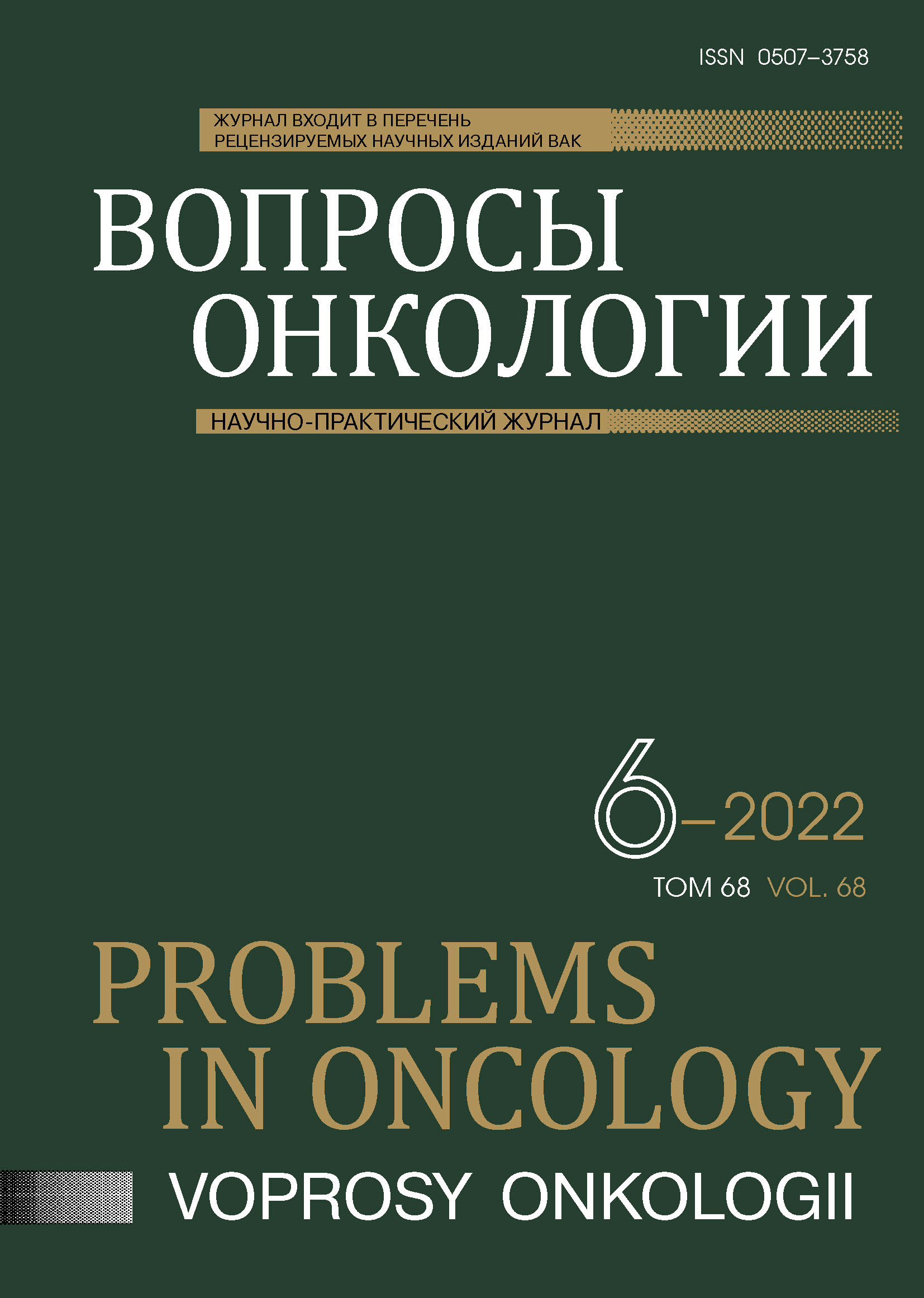Abstract
Background. Capmatinib has demonstrated high anti-tumor activity, as well as a manageable safety profile, in patients with advanced NSCLC with MET exon 14 (METex14) mutation in the Phase II Geometry mono-1 study.
Aim. Estimation of the efficacy and safety of capmatinib in the Russian subgroup of patients in the Geometry mono-1 study.
Materials and methods. Patients were enrolled in the Geometry mono-1 study according to their MET status and line of therapy. The Russian subgroup included patients treated with capmatinib as first- and second-line therapy. Capmatinib was administered at a dosage of 400 mg twice daily. The primary endpoint was objective response rate (ORR), and clinical benefit rate (CBR). The secondary endpoints were duration of response, progression-free survival (PFS), overall survival (OS) and safety profile.
Results. The analysis included 13 patients (4 males and 9 females) aged 59 to 82 years with metastatic NSCLC with METex14 mutation. ORR was 50% and CBR was 100% in the patients treated with capmatinib in the 1st line (n=6). ORR was 14.3%, and CBR was 71.4 in the 2nd line of the therapy (n=7). The median duration of response, regardless of therapy line, was 5.7 months. The median PFS with administration of capmatinib in the 1st line was 21.3 months, and in the 2nd line ― 3.5 months.
The median OS, depending on the line of the therapy, was as follows: in the 1st line ― 21.3 months, and in the 2nd ― 24.6 months.
The most common treatment-related adverse events (AEs) were peripheral edema (69.2%), hypocalcemia (53.8%), increased creatinine (46.2%); most of them were grade 1/2. No unexpected AEs were registered.
Conclusion. A high response to capmatinib treatment was registered in the Russian population. The therapy was well tolerated.
References
Majeed U, Manochakian R, Zhao Y, Lou Y. Targeted therapy in advanced non-small cell lung cancer: current advances and future trends // J Hematol Oncol. 2021;14:108. doi:10.1186/s13045-021-01121-2
Лактионов К.К., Артамонова Е.В., Бредер В.В. и др. Практические рекомендации по лекарственному лечению немелкоклеточного рака легкого // Злокачественные опухоли. 2021;11(3s2-1):36-54. doi:10.18027/2224-5057-2021-11-3s2-02 [Laktionov KK, Artamonova EV, Breder VV et al. Practical recommendations for drug treatment of non-small cell lung cancer // Malignant tumors. 2021;11(3s2-1):36-54. (In Russ.)]. doi:10.18027/2224-5057-2021-11-3s2-02
Han S, Fang J, Lu S et al. Response and acquired resistance to savolitinib in a patient with pulmonary sarcomatoid carcinoma harboring MET exon 14 skipping mutation: a case report // Onco Targets Ther. 2019;12:7323–8. doi:10.2147/OTT.S210365
Reungwetwattana T, Liang Y, Zhu V, Ou S-HI. The race to target MET exon 14 skipping alterations in non-small cell lung cancer: The Why, the How, the Who, the Unknown, and the Inevitable // Lung Cancer. 2017;103:27–37. doi:https://doi.org/10.1016/j.lungcan.2016.11.011
Pruis MA, Geurts-Giele WRR, von der TJH, Meijssen IC et al. Highly accurate DNA-based detection and treatment results of MET exon 14 skipping mutations in lung cancer // Lung Cancer. 2020;140:46–54. doi:10.1016/j.lungcan.2019.11.010
Drusbosky LM, Dawar R, Rodriguez E, Ikpeazu CV. Therapeutic strategies in METex14 skipping mutated non-small cell lung cancer // J Hematol Oncol. 2021;14:129. doi:10.1186/s13045-021-01138-7
Brazel D, Zhang S, Nagasaka M. Spotlight on Tepotinib and Capmatinib for Non-Small Cell Lung Cancer with MET Exon 14 Skipping Mutation // Lung Cancer (Auckland, NZ). 2022;13:33–45. doi:10.2147/LCTT.S360574
Tong JH, Yeung SF, Chan AWH et al. MET Amplification and Exon 14 Splice Site Mutation Define Unique Molecular Subgroups of Non–Small Cell Lung Carcinoma with Poor Prognosis // Clin Cancer Res. 2016;22:3048–56. doi:10.1158/1078-0432.CCR-15-2061
Mathieu LN, Larkins E, Akinboro O et al. FDA Approval Summary: Capmatinib and Tepotinib for the Treatment of Metastatic NSCLC Harboring MET Exon 14 Skipping Mutations or Alterations // Clin Cancer Res. 2022;28:249–54. doi:10.1158/1078-0432.CCR-21-1566
Seto T, Ohashi K, Sugawara S et al. Capmatinib in Japanese patients with MET exon 14 skipping–mutated or MET-amplified advanced NSCLC: GEOMETRY mono-1 study // Cancer Sci. 2021;112:1556–66. doi:https://doi.org/10.1111/cas.14826
Fujino T, Suda K, Mitsudomi T. Lung Cancer with MET exon 14 Skipping Mutation: Genetic Feature, Current Treatments, and Future Challenges // Lung Cancer (Auckland, NZ). 2021;12:35–50. doi:10.2147/LCTT.S269307
Schuler MH, Berardi R, Lim W-T et al. Phase (Ph) I study of the safety and efficacy of the cMET inhibitor capmatinib (INC280) in patients (pts) with advanced cMET+ non-small cell lung cancer (NSCLC) // J Clin Oncol. 2016;34:9067. doi:10.1200/JCO.2016.34.15_suppl.9067
Wolf J, Seto T, Han J-Y et al. Capmatinib in MET Exon 14–Mutated or MET -Amplified Non–Small-Cell Lung Cancer // N Engl J Med. 2020. doi:10.1056/nejmoa2002787
National Institute of Cancer. Common Terminology Criteria for Adverse Events (CTCAE), Version 4.0, DCTD, CTI, NIH, DHHS. 2009.
Cortot A, Le X, Smit E et al. Safety of MET Tyrosine Kinase Inhibitors in Patients With MET Exon 14 Skipping Non-small Cell Lung Cancer: A Clinical Review // Clin Lung Cancer. 2022;23:195–207. doi:10.1016/j.cllc.2022.01.003
Zhang L, Lin W, Yang Z et al. Multimodality Treatment of Pulmonary Sarcomatoid Carcinoma: A Review of Current State of Art // J Oncol. 2022;2022:8541157. doi:10.1155/2022/8541157
Zheng D, Wang R, Ye T et al. MET exon 14 skipping defines a unique molecular class of non-small cell lung cancer // Oncotarget. 2016;7(27).

This work is licensed under a Creative Commons Attribution-NonCommercial-NoDerivatives 4.0 International License.
© АННМО «Вопросы онкологии», Copyright (c) 2022
